If the Fellowcraft, climbing his three, five, and seven steps to a Middle Chamber of unknown proportions, containing an unknown wage, is overweighted with the emphasis put upon the spiritual side of life, he may here be comforted.
Freemasonry is not an ascetic organization. It recognizes that the physical is as much a part of normal life as the mental and spiritual upon which so much emphasis is put.
The Fellowcraft Degree is a glorification of education, the gaining of knowledge, the study of the Seven Liberal Arts and Sciences and all that they connote.
Therefore it is wholly logical that the degree should make special reference to the five means by which man has acquired all his knowledge; aye, by which he will ever acquire any knowledge.
All learning is sense-bound. Inspiring examples have been given the world by unfortunates deprived of one or more senses.
Blind men often make as great a success as those who see; deaf men often overcome the handicap until it appears nonexistent.
Helen Keller [was] blind, deaf, and was dumb as well; all that she has accomplished – and it would be a great accomplishment with all five senses – has been done through feeling and tasting and smelling.

But take away all five senses and a man is no more a man; perhaps his mind is no more a mind. With no contact whatever with the material world he can learn nothing of it.
As man reaches up through the material to the spiritual, he could learn nothing of ethics without contact with the physical.
If there are limits beyond which human investigations and explorations into the unknown may not go, it is because of the limitations of the five senses.
Not even the extension of those senses by the marvellously sensitive instruments of science may overcome, in the last analysis, their limits.

Some objects are smaller than any rays we know except X-rays. If it were possible to construct a microscope powerful enough to see an atom, the only light by which it could be seen would be X-rays.
But the very X-rays which would be necessary to see it would destroy the atom as soon as they struck it.
In our present knowledge, then, to see the atom is beyond the power of human senses.
If anything is beyond the power of eyes, even if aided by the greatest magnification, then there must be truths beyond the power of touch and taste and smell and hearing, regardless of the magnification science may provide.
Except for one factor! Brute beasts hear, see, feel, smell, and taste, as do we. But they garner no facts of science, win no truths, formulate no laws of nature through these senses.
More than the five senses are necessary to perceive the relation between thing and thing, and life and life.
That factor is the perception, the mind, the soul or spirit, if you will, which differentiates man from all other living beings.
If the Fellowcraft’s five steps, then, seem to glorify the five senses of human nature, it is because Freemasonry is a well-rounded scheme of life and living which recognizes the physical as well as the mental life of men and knows that only through the physical do we perceive the spiritual.
It is in this sense, not as a simple lesson in physiology, that we are to receive the teachings of the five steps by which we rise above the ground floor of the Temple to that last flight of seven steps which are typical of knowledge.
Article by: Carl H. Claudy
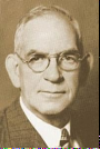
Carl Harry Claudy (1879 – 1957) was an American author, magazine writer, and journalist for the New York Herald.
His association with Freemasonry began in 1908, when, at the age of 29, he was raised a master Mason in lodge Harmony No. 17 in Washington, DC. He served as its master in 1932 and eventually served as Grand Master of Masons in the District of Colombia in 1943.
His Masonic writing career began in earnest when he became associated with the Masonic service Association in 1923, serving as associate editor of its magazine, The master mason, until 1931.
Under his leadership the service Association was brought to a place of predominance through his authorship and distribution of the short talk bulletin which made his name familiar to virtually every lodge in the country.
 Old Tiler Talks - Eyes Lifted High The Old Tiler Talks first published in 1925, by Carl Claudy, is a series of short anecdotal stories told in the setting of a new member asking an old tiler for his opinion on various masonic topics. These short articles are still very relevant, 100 years on, and hopefully provide some insight to new members today. |
 Old Tiler Talks - Masonic Libraries The Old Tilers talks first published in 1925, by Carl Claudy, is a series of short anecdotal stories told in the setting of a new member asking an old tiler for his opinion on various masonic topics. These short articles are still very relevant, 100 years on, and hopefully provide some insight to new members today. |
 Old Tiler Talks - So Many Rascals "Why are there so many rascals in the Fraternity, and why don't we turn them out?" a new member voiced to the old tiler for his opinion. These short articles are still very relevant, 100 years on, and hopefully provide some insight to new members today. |
 Old Tiler Talks - The Greatest Work The Old Tiler asked, "what is the greatest work of Masonry?" The New Brother sat by the guardian of the door and pulled out his cigar case. - Another instalment of wisdom by Carl Claudy, The Greatest Work |
 Old Tiler Talks - Why Men Love Freemasonry The 'Old Tiler Talks' first published in 1925, by Carl Claudy, is a series of short anecdotal stories told in the setting of a new member asking an old Tiler for his opinion on various Masonic topics. These short articles are still very relevant, 100 years on, and hopefully provide some insight to new members today. |
 Old Tiler Talks - Seeking a Little Light The Old Tilers talks first published in 1925, by Carl Claudy, is a series of short anecdotal stories told in the setting of a new member asking an old tiler for his opinion on various masonic topics. These short articles are still very relevant, 100 years on, and hopefully provide some insight to new members today. |
 The new mason laments that practically speaking, Masonry is a failure, and it depresses me … Masonry cannot be a failure, because men fail as Masons. The Old Tilers talk by Carl Claudy |
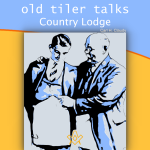 Old Tiler Talks - Country Lodge A lesson in the importance of an open mindset to observe, not to judge, but to learn and accept that we can achieve the desired outcome employing a different process. by Carl Claudy |
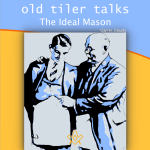 Old Tiler Talks - The Ideal Mason "What's your ideal of Freemasonry?" asked the Younger Mason - A short anecdotal story told in the setting of a new member asking an old tiler for his opinion on various masonic topics by Carl Claudy |
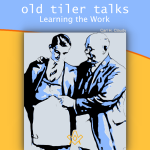 Old Tiler Talks - Learning the Work A short anecdotal story told in the setting of a new member asking an old tiler for his opinion on various masonic topics by Carl Claudy |
 Masonic first appointments and promotions might appear to be inequitable for one point a view, but some times, one point does not show the whole picture. A perfectly articulated story by Claudy, we should not compare one persons abilities with another. |
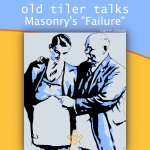 Old Tiler Talks - Masonry's 'Failure' Masonry fails because it doesn’t interest men sufficiently to make them practice what they preach. A perfectly articulated story by Claudy Masonry does not fail men. Men fail Masonry. Masonry has the teachings. |
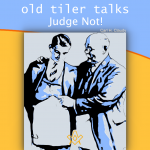 A perfectly articulated story by Claudy reminds us of a lesson from the Second Degree Charge; in the decision of every trespass against our rules, judge with candour, admonish with friendship, and reprehend with mercy. |
 Old Tiler Talks - A Masonic Speech A Masonic Speech - I can tell you the essence of appeal. It is drama. If you want your hearers to hang on your words, dramatize your subject |
 Old Tiler Talks - A Mason's Christmas A Mason's Christmas - Do you believe in Christmas celebrations should be held by the lodge ? Should members be asked to contribute to one and engage in Christmas festivities ? What is the old tilers take on this ? |
 Advertising - We would do more good in the world if we advertised ourselves more… Why ? |
 Uncover the mystery behind one of the oldest and most widespread symbols denoting God. |
 Do you want to discover the originals of the five points of fellowship ? |
 The mystery behind the two great pillars that stood at the porchway entrance of King Solomon Temple |
 Three numbers, what are their masonic significance? Pythagoras has something to say about them |
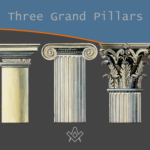 What are the Three Grand Pillars ?, wisdom, strength, and beauty - then later we hear of the Doric, Ionic, and Corinthian columns |
 This emblem contains more real food for thought than any other in the lecture of the Sublime Degree. |
 The Hiramic Legend is the glory of Freemasonry; the search for that which was lost is the glory of life |
 How are the Fellowcraft's five steps connected the five senses of human nature |
 How to explain the principle tents of the craft to a newly made brother |
 What are the lesser lights and where are they placed on our Lodges |
 Like so much else in Freemasonry the Middle Chamber is wholly symbolic |
 In the true sense of the words Freemasonry is not a secret society but a society with secrets. |
 Three Great Lights – the Volume of the Sacred Law, the Square, and the Compasses |
 Entered Apprentice Lambskin Apron; More ancient than the Golden Fleece or Roman Eagle, more honourable than the Star and Garter ... |
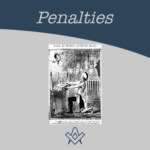 To the initiate, the penalty in his obligation comes with a shock of surprise and sometimes consternation. |
 What is a point within a circle |
masonic knowledge
to be a better citizen of the world
share the square with two brothers

click image to open email app on mobile device










